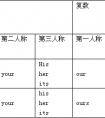—What did you do yesterday evening?—I wrote ________ composition.[ ]A. a 800-words B. an 800-word C. an 500-word D. a 400- words-九年级英语
题文
| —What did you do yesterday evening? —I wrote ________ composition. |
| [ ] |
| A. a 800-words B. an 800-word C. an 500-word D. a 400- words |
答案
| B |
据专家权威分析,试题“—What did you do yesterday evening?—I wrote ________ compos..”主要考查你对 不定冠词(a,an),形容词 等考点的理解。关于这些考点的“档案”如下:
不定冠词(a,an)形容词
考点名称:不定冠词(a,an)
- 不定冠词:
定冠词,英语虚词冠词的一种,冠词是虚词,本身不能单独使用,也没有词义,它用在名词的前面,帮助指明名词的含义。
英语中的冠词有三种,一种是定冠词,另一种是不定冠词,还有一种是零冠词。
不定冠词a(an)与数词one同源,是"一个"的意思。a用于辅音音素前,一般读作e,而an则用于元音音素前,一般读做en。 - 不定冠词基本用法:
不定冠词主要用在可数名词单数前,表示:
1.“一个”
She is a friend of mine.她是我的一位朋友。
可用在表示数量的词组中:four times a day, half a kilo
2. “某一个”
A car is waiting at the gate.有一辆车在门口等你。
3. 某类人或物(可用在表语、同位语中):
She is a Canadian (dancer.)她是加拿大人(舞蹈演员)。
4. 某类人或物(可作主语,表示整个这类人或东西):
A child needs love.孩子需要爱。 定冠词和不定冠词的区别:
一、不定冠词表示泛指,定冠词表示特指。
不定冠词a (an)与数词one 同源,是"一个"的意思。a用于辅音音素前,一般读作[e],而an则用于元音音素前,一般读做[en]。
1、表示"一个",意为one;指某人或某物,意为a certain。如:
A Mr. Ling is waiting for you.
2、 代表一类人或物 如:
A knife is a tool for cutting with.
Mr. Smith is an engineer.
二、定冠词the与指示代词this,that同源,有"那(这)个"的意思,但较弱,可以和一个名词连用,来表示某个或某些特定的人或东西。
定冠词的用法:
1、特指双方都明白的人或物:
Take the medicine. 把药吃了。
2、上文提到过的人或事:
He bought a house. I've been to the house. 他买了幢房子。我去过那幢房子。
3、指世上独一物二的事物:
the sun, the sky, the moon, the earth
4、单数名词连用表示一类事物,如:the dollar 美元; the fox 狐狸;
或与形容词或分词连用,表示一类人:the rich 富人; the living 生者。
5、用在序数词和形容词最高级,及形容词only, very, same等前面:
Where do you live? I live on the second floor. 你住在哪?我住在二层。
That's the very thing I've been looking for. 那正是我要找的东西。
6、与复数名词连用,指整个群体:
They are the teachers of this school.指全体教师)
They are teachers of this school. (指部分教师)
7、表示所有,相当于物主代词,用在表示身体部位的名词前:
She caught me by the arm.. 她抓住了我的手臂。
8、用在某些由普通名词构成的国家名称、机关团体、阶级、等专有名词前:
the People's Republic of China 中华人民共和国
the United States 美国
9、用在表示乐器的名词之前: She plays the piano. 她会弹钢琴。
10、用在姓氏的复数名词之前,表示一家人:
the Greens 格林一家人 (或格林夫妇)
11、用在惯用语中:
in the day, in the morning (afternoon,evening), the day after tomorrow
the day before yesterday, the next morning,
in the sky (water,field,country)
in the dark, in the rain, in the distance,
in the middle (of), in the end,
on the whole, by the way, go to the theatre冠词口诀:
冠词分为定冠、不定冠,
不定冠词a和an,“—”的含义表泛指
表示特指要用the,次序、方位、最高级
世上物体独一个,人或事物再次提
以下情况冠词免,学科球类三顿饭
名词复数表泛指,季节星期月份前不定冠词位置:
不定冠词常位于名词或名词修饰语前。注意:
a. 位于下列形容词之后: such,what,many,half,
I have never seen such an animal.
Many a man is fit for the job.
b. 当名词前的形容词被副词as, so, too, how, however, enough修饰时,不定冠词应放在形容词之后:
It is as pleasant a day as I have ever spent.
So short a time.
Too long a distance.
c. quite,rather与单数名词连用,冠词放在其后。
但当rather,quite 前仍有形容词,不定冠词放其前后均可。如:quite a lot
d. 在as,though 引导的让步状语从句中,当标语为形容词修饰的名词时,不定冠词放形容词后:
Brave a man though he is,he trembles at the sight of snakes. 他尽管勇敢,可见到蛇还是发抖。
当名词被比较级形容词修饰时,不定冠词通常置于比较级形容词之后。
定冠词通常位于名词或名词修饰语前,但放在all, both,double,half,twice,three times等词之后,名词之前。
All the students in the class went out. 班里的所有学生都出去了。
考点名称:形容词
- 形容词:
简称adj.或a,形容词用来修饰名词或代词,表示人或事物的性质、状态,和特征的程度好坏与否,形容词在句中作定语,表语,宾语补足语。
她是一个好学生,她学习努力。She is a good student, and she works hard.
这辆自行车很贵。This bike is expensive.
对不起,我现在很忙。I am sorry, I'm busy now.
你为这次会议做好准备了吗? Have you got everything ready for the meeting? - 形容词的语法功能:
一、作定语
He is the greatest writer alive.他是依然健在的伟大的作家。
Somewone else has done it.别人已经做了这事。
二、作补语
形容词做主语补足语和宾语补足语时,可以表示其现状、状态,也可以表示某一动作的结果,并常用在表示“认为,看待”的动词如believe,prove,consider等候。例如:
The news made her sad.这消息使他感到非常悲伤。
Don't marry young.不要早婚。
三、作状语
形容词或形容词短语可作状语,形容词作状语时,可以看作是“being+形容词”结构的省略,可表示时间、原因、条件、方式、强调或伴随状况等意义。例如:
Enthusiastic,they are co-operative.热心的时候他们是很合作的。
Rich or poor, young or old, we all have problems.不管是穷人还是富人,不管是年轻人还是老人,我们都有问题。
四、做表语
The ship was adrift on unknown seas.那艘船在陌生的海域漂流。
五、做主语
Old and young joined the discussion.
Rich or poor meant the same to him.作感叹语
Very good!Say it again.
Stupid!He must be crasy. 形容词的几个特殊用法:
most 同形容词连用而不用 the, 表示 " 极,很,非常, 十分"。
It's most dangerous to be here. 在这儿太危险。
I cannot do it, it's most difficult. 我干不了这件事,太难了。
"The+形容词比较级..., the+形容词比较级..." 表示 " 越... 就越..."。
The more you study, the more you know. 你学的越多, 就知道的越多。
- 最新内容
- 相关内容
- 网友推荐
- 图文推荐
| [家长教育] 孩子为什么会和父母感情疏离? (2019-07-14) |
| [教师分享] 给远方姐姐的一封信 (2018-11-07) |
| [教师分享] 伸缩门 (2018-11-07) |
| [教师分享] 回家乡 (2018-11-07) |
| [教师分享] 是风味也是人间 (2018-11-07) |
| [教师分享] 一句格言的启示 (2018-11-07) |
| [教师分享] 无规矩不成方圆 (2018-11-07) |
| [教师分享] 第十届全国教育名家论坛有感(二) (2018-11-07) |
| [教师分享] 贪玩的小狗 (2018-11-07) |
| [教师分享] 未命名文章 (2018-11-07) |

![— Do you know Meimei? — Yes, she is from a university and she is _____ honest girl. [ ]A. a B. an C. / -九年级英语](http://www.00-edu.com/d/file/ks/4/2/budingguanciaan/2019-11-29/small4247048cc84563d0252c1b027b2033211574983264.png)
![—Did that sportsman win ____ gold medal at ____Athens Olympics?—Yes, he did.[ ]A. a; an B. a; theC. a; / D. /; the-九年级英语](http://www.00-edu.com/d/file/ks/4/2/budingguanciaan/2019-11-29/small06f379c6a3c3ac9bb311d3a899491d161574984708.png)
![We don’t think she is ____ honest girl. [ ]A. a B. an C. the D. /-八年级英语](http://www.00-edu.com/d/file/ks/4/2/budingguanciaan/2019-11-29/small71b0b51d70c69d2813b4c24ce33ea1331574983883.png)
![— Do you have _____ MP3? — NO, I don't.[ ]A. a B. an C. the -九年级英语](http://www.00-edu.com/d/file/ks/4/2/budingguanciaan/2019-11-29/smallb4936ea5ddac8c680b9d3e87837821eb1574983324.jpg)

